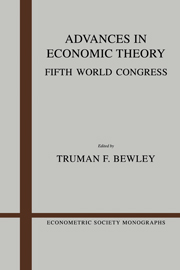Book contents
- Frontmatter
- 1 Auction theory
- 2 Game-theoretic analyses of trading processes
- 3 The theory of contracts
- 4 Battles for market share: incomplete information, aggressive strategic pricing, and competitive dynamics
- 5 A sequential strategic theory of bargaining
- 6 On the complexity of linear programming
- 7 Laboratory experimentation in economics
- 8 Increasing returns and the theory of international trade
- 9 Strategic aspects of trade policy
- 10 Equilibrium without an auctioneer
- 11 Arrow-Debreu programs as microfoundations of macroeconomics
7 - Laboratory experimentation in economics
Published online by Cambridge University Press: 05 January 2013
- Frontmatter
- 1 Auction theory
- 2 Game-theoretic analyses of trading processes
- 3 The theory of contracts
- 4 Battles for market share: incomplete information, aggressive strategic pricing, and competitive dynamics
- 5 A sequential strategic theory of bargaining
- 6 On the complexity of linear programming
- 7 Laboratory experimentation in economics
- 8 Increasing returns and the theory of international trade
- 9 Strategic aspects of trade policy
- 10 Equilibrium without an auctioneer
- 11 Arrow-Debreu programs as microfoundations of macroeconomics
Summary
Introduction
Controlled experiments conducted by economists under laboratory conditions have a relatively short history. Only in the last ten years has laboratory experimentation in economics completed the transition from being a seldom-encountered curiosity to a well-established part of the economic literature. (The Journal of Economic Literature has this year initiated a separate bibliographic category for “Experimental Economic Methods.”) How this came to pass makes for an interesting episode in the history and sociology of science. In this chapter, however, we discuss the different uses to which laboratory experimentation is being put in economics.
I think that, loosely speaking, many of the experiments that have been conducted to date fall on an imaginary continuum somewhere between experiments associated with testing and modifying formal economic theories (which I shall call “Speaking to Theorists”), and those associated with having a direct input into the policy-making process (“Whispering into the Ears of Princes”). Somewhere in between lie experiments designed to collect data on interesting phenomena and important institutions, in the hope of detecting unanticipated regularities (“Searching for Facts”). Most experimental investigations contain elements from more than one of these categories.
In the following sections I briefly describe examples of each of these activities, and how they interact with and contribute to other parts of economic research. I like to think of economists who do experiments as being involved in three kinds of (overlapping) dialogues, which the examples are designed to illustrate. Material discussed under the heading "Speaking to Theorists" illustrates the kind of dialogue that can exist between experimenters and theorists, whereas the material in "Searching for Facts" illustrates the kind of dialogue that experimenters can engage in with one another. The section entitled "Whispering in the Ears of Princes" deals of course with the kind of dialogue that experimenters can have with policy makers.
- Type
- Chapter
- Information
- Advances in Economic TheoryFifth World Congress, pp. 269 - 300Publisher: Cambridge University PressPrint publication year: 1987
- 11
- Cited by



